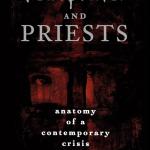(This month, I am taking a short break from my megachurch visits series.)
Over at CT, global managing editor Morgan Lee has a new article with a curious problematic. It’s not Israel or Palestine or the 2024 election; no, it’s “Taylor Swift,” whom Lee laments, “can do whatever she wants.”
Lee’s coverage of Swift’s latest, “The Tortured Poets Department” (TTPD), focuses attention on the singer’s (purportedly) lackluster songwriting therein. TTPD’s shortcomings don’t simply reflect a slump; in Lee’s take, they reveal a character flaw– something like pride. “The problem with [Swift’s] hubris isn’t just aesthetic… It suggests an artist unwilling to accept the wisdom of others.” Lee posits Swift’s album suffers from the singer’s unwillingness to accept editing. Actually, it’s even worse than this: the problem is that Taylor “answers to no one.” The article imagines a jet-setting Taylor enacting preeminence over both “mayors” and the Japanese embassy. Taylor runs roughshod over dignitaries and elected officials! The article’s accompanying image derisively depicts Swift as a queen.
How, you may wonder, is this a Christian concern? Why is CT so rankled by Taylor’s freedoms?
Readers familiar with the last seven years of Christianity Today’s coverage of women might hear a familiar refrain in Lee’s critique of Swift. Back in 2017, CT began problematizing women who speak about matters of faith without any “church authority” over them–women they said had “big platforms” without “accountability.” Bestselling authors like Jen Hatmaker, in these takes, supposedly lead their readers astray because they lack ecclesial hierarchs to set limits on their speech.Why, CT asked in earnest, are bloggers and speakers like Hatmaker able to speak and teach? Who, they cried, is authorizing this?
For CT, the answer was seemingly not the first amendment; it came down, instead, to the internet, which wantonly allows lay women to gain followings (reduced here to “likes”). In more recent treatments, CT problematizes the market, which gives women, most especially Taylor Swift, “outsized” influence. Both the market and the internet can be depicted as money-driven and corrupting– and therefore as illegitimate means to influence. CT would therefore like Christian women to choose to forego such unfettered, ungoverened access to establishing an audience. Lee’s subtitle: “true liberty, in art and in life, is created by constraints.”
I’ve been surprised to read, and unpersuaded by, CT’s admonitions that women find fresh ways to submit themselves to “authorities.” Their call doesn’t seem to have had much effect on women influencers either, who have maintained both their social media followings and book sales. Yet, CT’s call for restraint and submission in women’s careers has only grown more ambitious– and is now expanding to include a call for women to embrace new “limits” over romantic decisions!
Lee problematizes one TTPD song in particular: “But daddy, I love him.” Many readers hear the title of this song, and its contents, as Swift’s echo of the protestation of Ariel, Disney’s The Little Mermaid (1:10). Others hear it as an echo of Allie, Rachel McAdams’ character in The Notebook. (Swift fans have  already developed videos that blend Swift’s words with images from both movies.) Both movies feature young women wresting the authority to decide their marriage partners for themselves; Swift’s “but daddy, I love him” song features her rejection of familial oversight and expression of romantic autonomy.
already developed videos that blend Swift’s words with images from both movies.) Both movies feature young women wresting the authority to decide their marriage partners for themselves; Swift’s “but daddy, I love him” song features her rejection of familial oversight and expression of romantic autonomy.
Here is where the tussle with Swift takes some shape, because at present CT is rethinking how women should decide who they date and marry. This January, CT published an article against The Notebook, some twenty years after its release. This article, “Past-lives is the Anti-Notebook,” again advocates for choosing constraints over love: “We’ve romanticized stories of destiny-driven love… This drama shows the beauty of limits.” In this article, Morgan Lee traces the origins of romantic liberty to The Notebook, which movie and which liberty she flatly advises readers to give up. In short, Lee doesn’t think The Notebook is Christian: “Again and again, Scripture teaches that we often don’t know what’s best for us; we need each other to discern what’s beneficial and what’s not. Listen to advice and accept discipline, and at the end you will be counted among the wise.” Lee advises romantic heroines to listen, not to their hearts, but to persons with the authority to “advise” and “discipline” them– people like parents.
Recent research I’ve been doing into the roots of Pentecostals’ romantic eschatology (for which I have been investigating “bridal” agency) has left me wondering whether, in these articles, Christianity Today is stricken with amnesia. Romantic female authority has older roots than The Notebook (2004); it is predicated on far more than the internet. One can trace the roots of romantic feminine agency some two hundred years prior to Jane Austen’s Mansfield Park (1814) and its Christian worldview. Mansfield Park features a heroine called Fanny Price, who refuses her uncle’s demand that she marry a Mister Crawford (for elevated status) to instead marry for love. Though Fanny is first banished for her disobedience, she emerges victorious as the novel’s true “infallible guide concerning matters of the heart.” This is a major shift in the structures of authority: Fanny’s uncle is, before this moment, an English patriarch and landed gentry. Like Little Mermaid’s King Triton, he has both filial and sociopolitical power. But the drama of Austen’s story emphasizes Fanny’s steadfast heart and judgment and transforms them into domestic authority: Fanny, not her uncle, knows best. In contrast to the short-sightedness and bad judgment of literally every other character, Fanny possesses a well-formed conscience and sensitive heart– both developed through years of reading. Accordingly, she doesn’t need to defer romantic decisions to the counsel of others; Fanny needs most to listen to her own heart and her own head. (Another Austen character, Persuasion‘s Anne Elliott, messes up her life by listening too much to others!) It probably isn’t too much to posit that the marriage plot, in Austen’s hands, became one of the earliest sources of women’s rightful agency and authority. To attempt to deny women this agency, or to recommend that they willingly give it up themselves, could be to strike at our culture’s foundations of female autonomy.
 When Taylor asserts her right to make her own romantic choices, she does so having inherited (not only the legal rights to do so, thank heavens, but also) the authority to do so from a long literary tradition that asserts that, when it comes to matters of the heart, young women know best for themselves. It isn’t, therefore, a coincidence that Taylor invokes literariness with the title of her album, that is, placing herself in a “tortured poets” society. If CT wants to valorize, instead, submission to elders in women’s romantic lives, they won’t have to take on just Taylor Swift, Rachel McAdams, and one smallish mermaid–they’ll have to deal with the matriarch of English literature, Jane Austen. Though Austen’s works are two centuries old, published between 1811-1817, it is hard to overstate their enduring popularity. Successful film adaptations of Persuasion (2022), Emma (2020), and Pride and Prejudice (2005) are really just the tip of the iceberg here. Of Austen’s enduring popularity, English Professor Michael Gamer offers: “I would say that of dead authors, she may very well be the most popular out there.” Gamer estimates Austen is perhaps “second to Shakespeare, but arguably with a greater fan base.” Taking Austen on would be no small feat; it’s far easier to take on Taylor.
When Taylor asserts her right to make her own romantic choices, she does so having inherited (not only the legal rights to do so, thank heavens, but also) the authority to do so from a long literary tradition that asserts that, when it comes to matters of the heart, young women know best for themselves. It isn’t, therefore, a coincidence that Taylor invokes literariness with the title of her album, that is, placing herself in a “tortured poets” society. If CT wants to valorize, instead, submission to elders in women’s romantic lives, they won’t have to take on just Taylor Swift, Rachel McAdams, and one smallish mermaid–they’ll have to deal with the matriarch of English literature, Jane Austen. Though Austen’s works are two centuries old, published between 1811-1817, it is hard to overstate their enduring popularity. Successful film adaptations of Persuasion (2022), Emma (2020), and Pride and Prejudice (2005) are really just the tip of the iceberg here. Of Austen’s enduring popularity, English Professor Michael Gamer offers: “I would say that of dead authors, she may very well be the most popular out there.” Gamer estimates Austen is perhaps “second to Shakespeare, but arguably with a greater fan base.” Taking Austen on would be no small feat; it’s far easier to take on Taylor.
It’s something of mistake to do either, I think, because in doing so, CT would be fighting the roots of its own tradition. Many critics have noted that Fanny’s character embodies the values of Anglican Evangelicalism, which literary scholar Kathryn Sutherland describes as “a conservative middle class ideology which offered an effective public platform for women as moral campaigners.” (In her brilliant treatment of the book, Sutherland calls Fanny a redemptive “Eve” and “angelical”– the original evangelical, as she puts it.) As to moral campaign: Fanny has been interpreted as an abolitionist. Patricia Rozema’s 1999 film adaptation takes disparate lines and themes in Austen’s text (for example, Fanny presses her uncle with questions about the slave trade in an unusually forthright manner) and portrays them as a robust feature of Fanny’s moral sensibilities. The film, then, portrays Fanny’s high-minded ideas about love and marriage (that she should actually love her would-be husband; that he should actually possess good character–not just status) as of a piece with her high-minded moralism about human relations (that there should not be slavery.) This layering of moral sensibilities and concerns, in Fanny, makes rich sense given the evangelical religious ambiance of the work. Fanny’s anglican evangelical historical counterparts could well have been active in England’s Clapham Sect (1790-1830), which championed harmonious domestic relations, successfully campaigned for the abolition of slavery, and created place for women’s voices. Fanny Price, as a character, forwards the idea that women-following-their-hearts are virtuous protagonists in church, home, and public life. She has an evangelical heritage –and she’s bequeathed to women at large the sensibility that they should, especially in romantic matters, consult the their own hearts. Thus Taylor:
“God save the most judgmental creepsWho say they want what’s best for me…Thinking it can change the beatOf my heart when he touches meAnd counteract the chemistryAnd undo the destiny”
Since as Sunderland and others have suggested, Fanny Price is not just the “ur-Victorian romantic heroine” but also the faithful image of early progressive Anglican Evangelicalism, it is hard to understand why CT presently conceives both women’s romantic agency and women’s public expressions of faith as– not proper to evangelicalism and part of its contributions to our culture, but instead–being the ill-conceived developments of the market, of the internet, and in dire need of oversight. Lee herself seems to recognize her logic is a bit afield of Christian tradition when she admits she is advocating for Buddhist revisions to how we evangelical readers think about marriage.
For now, I am still wondering: where is CT’s will to dominate a 34 year old popstar really coming from?













